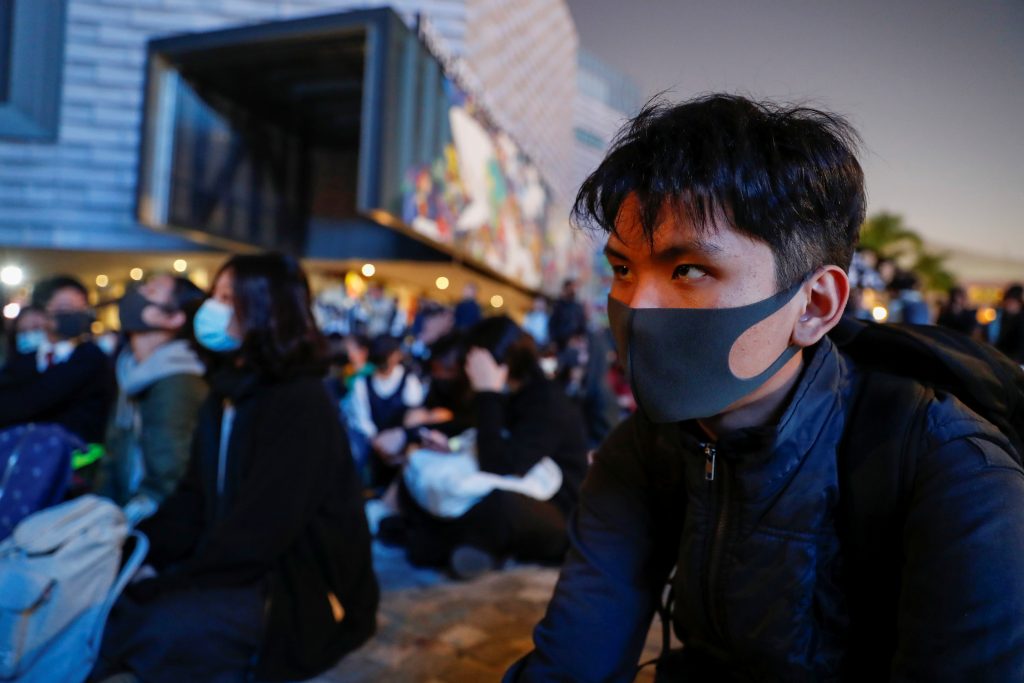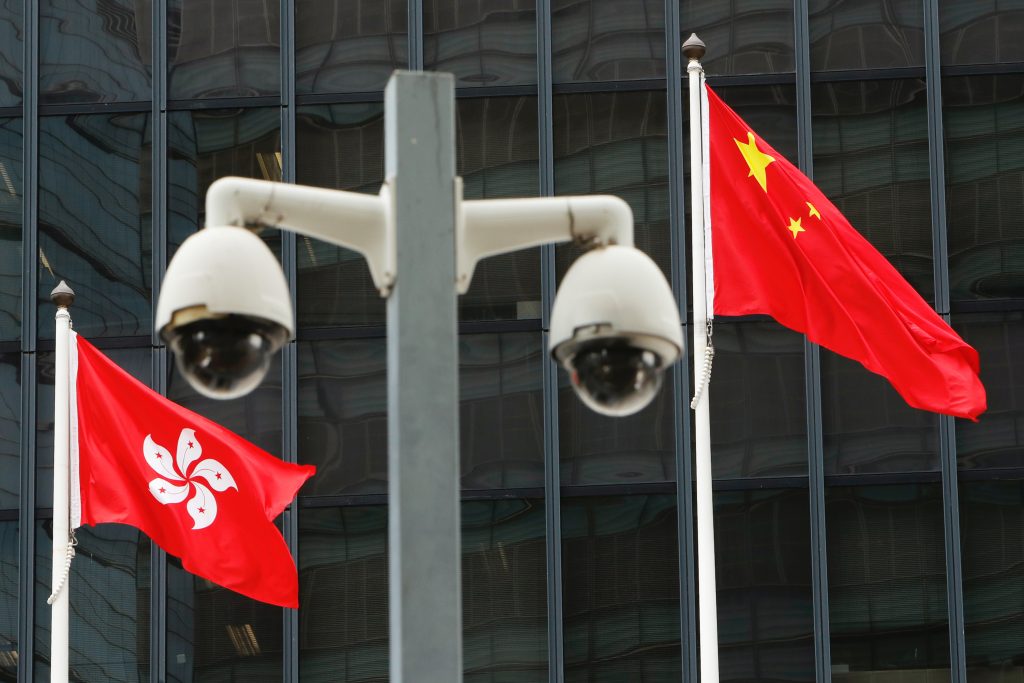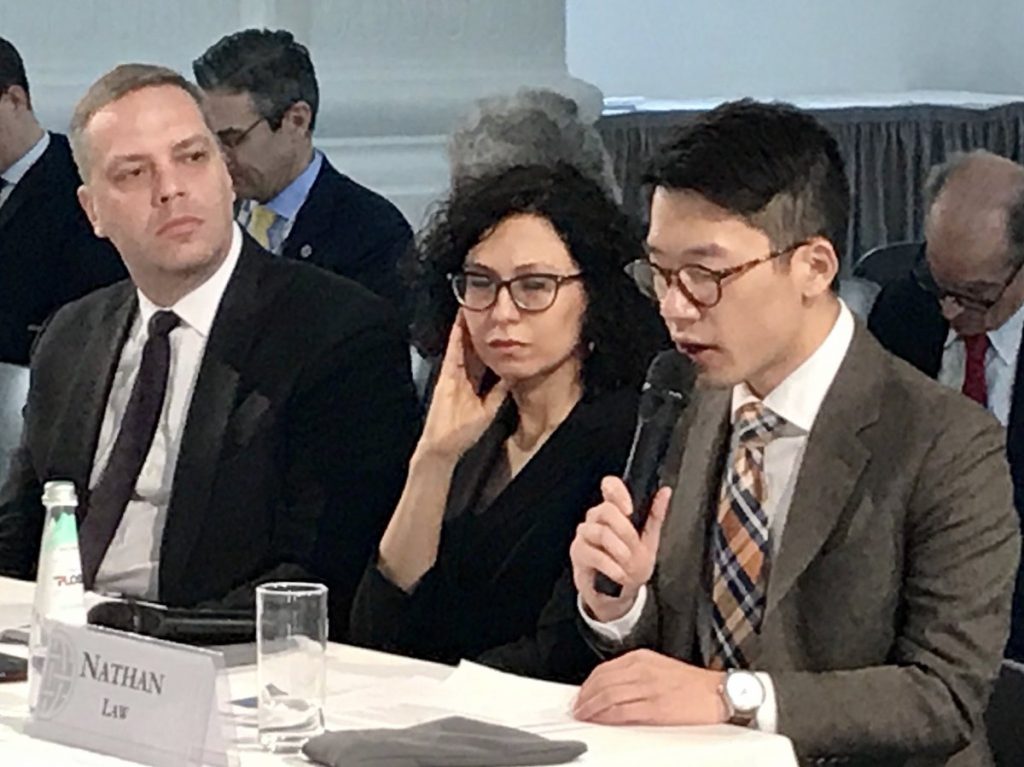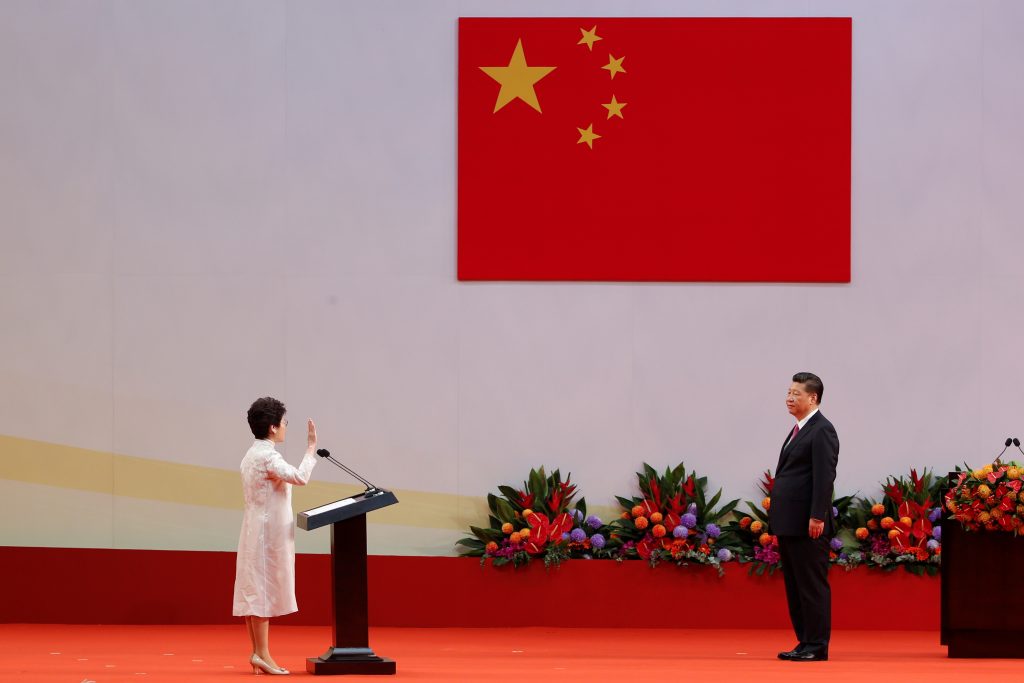Countering China’s crackdown on Hong Kong
This Issue Brief was prepared for the Free World Commission and was co-authored by Anna Downs, graduate student researcher, School of Foreign Service, Georgetown University, and Ash Jain, senior fellow in the Scowcroft Center for Strategy and Security.
The views expressed in this publication represent those solely of the authors and are not intended to imply any endorsement of the content by members of the Free World Commission.
Executive Summary
In June 2020, China enacted a series of repressive national security laws in Hong Kong aimed at asserting greater control over the city and its people. In response, leading democracies around the world have spoken out against these laws and implemented a range of measures aimed at penalizing Beijing and assisting the people of Hong Kong. While the actions taken to date have been useful, to maximize their impact, leading democracies need to coordinate their actions more effectively and consider more robust measures. Legislators, in particular, can play a meaningful role in ensuring that national actions are better coordinated across the democratic world. The Free World Commission, which brings together influential legislators from leading democracies, can also help ensure that these measures are coordinated and aligned.
This issue brief sets forth the following goals and corresponding recommendations relating to Hong Kong. First, to help mitigate the impact of the national security legislation on the people of Hong Kong, leading democracies should pass asylum measures and identify opportunities to breakdown or weaken China’s firewall. Second, to impose penalties to pressure China to scale back enforcement and deter the PRC from further actions that restrict Hong Kong’s autonomy and freedoms, leading democracies should implement travel and financial sanctions, revoke special privileges, create special envoys, and identify opportunities to influence and/or weaponize Hong Kong’s special status as an international financial center and popular tax haven for Chinese elites. Third, to defend other democratic societies from Chinese malign influence, leading democracies should act to reaffirm Taiwan’s commitment to defend itself and strengthen the resilience of other potentially vulnerable nations.

Background
On June 30, 2020, China enacted a series of national security laws targeted at Hong Kong (“the Legislation”). The measure increases the central government’s control over Hong Kong citizens by providing Chinese officials with the authority to monitor, try, and punish “secession, subversion, terrorism, and colluding with foreign governments.” In addition, the Legislation expands the abilities of Chinese police in Hong Kong—including the ability to search without warrants—and gives the PRC the power to monitor and censor the internet in Hong Kong, and arrest protestors and individuals critical of the government. Taken in full, the Legislation reduces Hong Kong’s autonomy, eliminates the many fundamental freedoms of Hong Kong citizens, and undermines China’s commitment to maintain Hong Kong’s special status under the treaty with the United Kingdom which governs China’s administration of Hong Kong.
This treaty, the Sino-British Joint Declaration, signed in 1984, sets the terms of the British handover of Hong Kong to China, which took place in 1997, at which time Britain’s lease of the region was to expire. The Treaty conditioned that China abide by the “one country, two systems” principle in relation to its control over Hong Kong as a Special Administrative Region (HKSAR), and maintain Hong Kong’s special status until 2047. The third paragraph of the Treaty specifically states that “[t]he current social and economic systems in Hong Kong will remain unchanged, and so will the life-style. Rights and freedoms, including those of the person, of speech, of the press, of assembly, of association, of travel, of movement, of correspondence, of strike, of choice of occupation, of academic research and of religious belief will be ensured by law in the [HKSAR].”1digitalcommons.lmu.edu/cgi/viewcontent.cgi?article=1071&context=ilr
The June 2020 national security legislation implemented over Hong Kong demonstrated China’s intention to act with impunity to dismantle Hong Kong’s autonomy and freedoms and suppress protests, alarming Hong Kongers and observers worldwide. On the first day under the new security laws, Hong Kong saw more than 370 people arrested.2www.thestar.com/news/canada/2020/07/03/what-the-new-hong-kong-security-law-means-for-canadians-everywhere.html Hong Kong’s press, universities, and social media users have experienced a chilling effect on free speech and social debate, as residents self-censor in fear of the national security law being used against them if they criticize the CCP.3www.theguardian.com/education/2020/oct/12/academics-warn-of-chilling-effect-of-hong-kong-security-law Additionally, China’s ‘Great Firewall’ is now encroaching into Hong Kong, as the police are now authorized to censor online speech and extract user information from private internet providers.4www.theguardian.com/world/2020/jul/08/china-great-firewall-descends-hong-kong-internet-users Hong Kong residents are already deleting any critical online content en masse, looking ahead to the complete eradication of local internet freedom. The recent collective resignation of Hong Kong’s pro-democracy legislators poses a further challenge to Beijing’s authority, but may also lead to the further erosion of dissent within Hong Kong.
Recent Actions by Leading Democracies
In response to the enactment of the national security legislation by the PRC in Hong Kong, several leading democracies have acted swiftly to counter and punish China, as well as protect Hong Kong citizens.5See Annex 1 for a full map of policies and actions by democratic governments relating to the Hong Kong national security legislation.
Several nations—Australia, Canada, France, Germany, New Zealand, and the UK—have suspended extradition treaties with Hong Kong; the European Union is currently considering similar actions.6www.bbc.com/news/uk-politics-53476811; www.bbc.com/news/world-australia-53344013; www.bbc.com/news/uk-politics-53476811; www.bbc.com/news/world-australia-53344013; www.reuters.com/article/us-hongkong-protests-canada/canada-suspends-its-extradition-treaty-with-hong-kong-eyes-immigration-boost-idUSKBN24420I; www.reuters.com/article/us-hongkong-security-newzealand/new-zealand-suspends-extradition-treaty-with-hong-kong-idUSKCN24S2U1; www.fnlondon.com/articles/eu-imposes-sanctions-over-hong-kong-security-law-20200729 In a similar move, the US Department of State suspended three bilateral agreements with Hong Kong covering the surrender of fugitive offenders, the transfer of sentenced persons, and reciprocal income tax exemptions derived from the international operation of ships.7www.state.gov/suspension-or-termination-of-three-bilateral-agreements-with-hong-kong/
The United States has also responded with sanctions: the US Office of Foreign Asset Control (OFAC) placed travel and financial sanctions on 15 officials involved in the enactment and enforcement of the Legislation.8home.treasury.gov/news/press-releases/sm1088; www.scmp.com/business/banking-finance/article/3097680/us-sanctions-will-make-everyday-life-headache-hong-kongs; www.reuters.com/article/us-usa-china-hongkong/u-s-to-announce-sanctions-on-four-people-over-hong-kong-crackdown-sources-idUSKBN27P2F2 Additionally, several jurisdictions—Canada, the EU, Germany, the United Kingdom, and the United States—have placed export controls on Hong Kong to limit the trade of arms, sensitive technologies, military equipment, defense equipment, or other materials that are dual-use and could be coopted for internal repression, the interception of internal communications, or cyber surveillance.9sanctionsnews.bakermckenzie.com/eu-agrees-to-restrict-sensitive-exports-to-hong-kong/; techcrunch.com/2020/06/29/u-s-suspends-export-of-sensitive-tech-to-hong-kong-as-china-passes-new-national-security-law/; www.exportcontrolprofession.co.uk/2020/08/05/new-controls-could-have-significant-impact-on-exporters-of-strategic-items-to-hong-kong/
In addition, Australia, Taiwan, and the United Kingdom have offered Hong Kong citizens asylum, including 5-year visa extensions, visas for skilled and graduate visa-holders from Hong Kong, permanent paths to residency, and the opening of offices to provide assistance and place asylum seekers.10www.businessinsider.com/hong-kong-countries-offering-citizenship-refugee-status-2020-7#neighboring-island-taiwan-which-has-its-own-political-disputes-with-china-opened-up-a-new-office-to-help-hong-kongers-flee-2; immi.homeaffairs.gov.au/news-media/archive/article?itemId=415; www.foreignaffairs.com/articles/china/2020-07-30/what-fast-track-asylum-seekers-hong-kong; www.fragomen.com/insights/alerts/new-visa-options-announced-hong-kong-sar-passport-holders; www.npr.org/2020/06/03/868859749/u-k-willing-to-admit-nearly-3-million-from-hong-kong-if-china-adopts-security-la ; www.bbc.com/news/uk-politics-53246899 In addition, both the EU and Japan are considering measures relating to asylum, migration, visas, and residence policy for Hong Kong residents, including lifting work visa restrictions.
At the United Nations, 27 countries, led by the United Kingdom and including several leading democracies, signed onto a joint statement criticizing China’s actions in Hong Kong. However, at the same time China was able to persuade 53 other countries to sign onto a separate joint statement expressing support for China’s actions.11www.axios.com/countries-supporting-china-hong-kong-law-0ec9bc6c-3aeb-4af0-8031-aa0f01a46a7c.html These mostly non-democratic nations, including Cuba, North Korea, and Saudi Arabia, joined with a few small democracies that have interests in maintaining close economic ties to China – Antigua and Barbuda, Dominica, and Suriname. Additionally at the UN, the foreign ministers of Australia, Canada, New Zealand, and the United Kingdom jointly issued a request for the creation of a special UN envoy to monitor the legislation’s impact on Hong Kong.12www.theguardian.com/australia-news/2020/jun/04/australia-will-continue-to-welcome-hong-kong-residents-as-calls-mount-to-match-uks-offer-of-safe-haven Most recently, in November 2020 the “Five Eyes” nations—Australia, Canada, New Zealand, the United Kingdom, and the United States—jointly called for China to reconsider its disqualification of four critical Hong Kong legislators, and their “immediate reinstate[ment].”13[1] www.theguardian.com/world/2020/nov/19/five-eyes-allies-call-on-china-to-reverse-ban-on-hong-kong-pro-democracy-legislators
In addition to actions by governments, legislative bodies in leading democracies have also been pursuing actions in response to Hong Kong national security law.14See Annex 2 for a full map of resolutions and laws by democratic legislatures relating to the Hong Kong national security legislation. In the United States, the Hong Kong Autonomy Act was enacted in July 2020, requiring the imposition of financial sanctions on foreign officials and entities violating Hong Kong’s autonomy, which has already been utilized to place OFAC sanctions on violators (the OFAC sanctions cited above).15www.businessinsider.com/hong-kong-countries-offering-citizenship-refugee-status-2020-7#the-us-recently-passed-legislation-to-protect-human-rights-in-hong-kong-on-thursday-bipartisan-lawmakers-put-forward-legislation-to-offer-refugee-status-to-hong-kongers-3 Additionally, the Hong Kong Safe Harbor Act was introduced in the House of Representatives in June, which considers measures to designate certain Hong Kong residents with priority status for refugee consideration, and could give Hong Kong residents priority status for refugee consideration.16www.congress.gov/bill/116th-congress/house-bill/7415; www.businessinsider.com/hong-kong-countries-offering-citizenship-refugee-status-2020-7#the-us-recently-passed-legislation-to-protect-human-rights-in-hong-kong-on-thursday-bipartisan-lawmakers-put-forward-legislation-to-offer-refugee-status-to-hong-kongers-3 Lastly, the US Safeguarding Internet Freedom in Hong Kong Act of 2020 was introduced in the House of Representatives in July 2020, to consider measures to establish programs to promote internet freedom in Hong Kong.17www.kaine.senate.gov/PRESS-RELEASES/LANKFORD-KAINE-INTRODUCE-BILL-TO-COMBAT-INTERNET-CENSORSHIP-IN-HONG-KONG
In the UK, the bipartisan parliamentary group All-Party Parliamentary group (APPG) issued a report in August on the Legislation, while urging Magnitsky-style sanctions on Carrie Lam—the Executive Chief of Hong Kong who has enabled the CCP’s crackdown—and on Hong Kong’s police commissioner.18hongkongfp.com/2020/08/04/in-full-uk-lawmakers-call-on-govt-to-sanction-hong-kongs-carrie-lam-following-police-rights-abuses/; abcnews.go.com/International/wireStory/uk-lawmakers-urge-sanctions-hong-kong-police-violence-72162337 Several members of parliament in the UK have also endorsed and called for sanctions on officials involved in enacting the Legislation.19www.taiwannews.com.tw/en/news/3993112 The Japanese Diet is considering a bill to demand the executive branch investigate human rights abuses in Hong Kong and consider placing financial and travel sanctions on Chinese violators.20www.scmp.com/week-asia/politics/article/3095652/japan-mps-push-hong-kong-sanctions-bill-wake-national-security Although these actions demonstrate a desire among legislators in leading democracies to address China’s repression in Hong Kong, many of these proposals remain pending.
Recommendations
The actions taken by governments and legislatures to date have been useful. However, to make real impact, greater coordination among leading democracies is necessary, and should be oriented toward the following goals:
- Mitigate the impact of the national security laws on the people of Hong Kong.
- Impose penalties to pressure China to revoke the laws and deter further actions that restrict Hong Kong’s autonomy.
- Defend other vulnerable democratic nations against Chinese malign influence.

Mitigate the impact of the national security laws on the people of Hong Kong
To help mitigate the impact of the national security legislation on the people of Hong Kong, leading democracies should consider three specific actions. First, leading democracies should look for ways to coordinate asylum measures, including the establishment of an international joint committee, to offer asylum to Hong Kong citizens at greatest risk of arrest or abuse by China under the new laws. This coordination between nations will increase their ability to assist Hong Kongers seeking asylum, through joint strategic planning and the creation of a systematic approach to granting asylum that can streamline the process so those in Hong Kong understand where to place asylum requests. Second, leading democracies should identify opportunities to breakdown or weaken China’s “Great Firewall”, in order to ensure greater access for the people of Hong Kong to uncensored information. This may include efforts to monitor requests by Chinese officials and law enforcement agencies to internet and social media companies based in democratic nations and operating in Hong Kong for citizens’ personal data, and supporting denials of these requests and the relocation of data servers overseas.21www.bloomberg.com/news/articles/2020-07-14/how-china-s-great-firewall-could-encircle-hong-kong-quicktake; www.nytimes.com/2020/07/07/business/hong-kong-security-law-tech.html
Third, democratic nations should establish international norms regarding the operation of international technology companies regarding data protections and privacy in Hong Kong, including the withdrawal of services in repressive regimes in which protection of personal data is impossible.22www.theguardian.com/world/2020/jul/08/china-great-firewall-descends-hong-kong-internet-users; www.nytimes.com/2020/07/07/business/hong-kong-security-law-tech.html By working with a wide array of international stakeholders including multinational “big tech” companies, the international community may be able to stall—or even prevent—the degradation of internet freedom in Hong Kong. These companies can directly mitigate the expansion of state surveillance and censorship in Hong Kong by refusing requests to remove websites and social media posts as well as handover personal data. However, because the national security legislation in Hong Kong permits for the fining and arrest of company employees who refuse to handover information to Chinese authorities or takedown critical websites or posts, some of these recommendations may be difficult to enact, and may lead to a stark choice for internet companies to either continue to operate in Hong Kong and cooperate with authorities, or to halt local operations. Although the effectiveness of the above recommendations in entirely halting the encroachment of the firewall into Hong Kong is uncertain, these actions increase costs to the PRC of suppressing internet freedom, while simultaneously decreasing firewall effectiveness in Hong Kong.
Impose penalties to pressure China to revoke the national security laws and deter further actions that restrict Hong Kong’s autonomy
To impose penalties to pressure China to scale back enforcement and deter the PRC from further actions that restrict Hong Kong’s autonomy and freedoms, democratic nations should coordinate the implementation of targeted travel and financial sanctions on PRC and Hong Kong officials in charge of the violent suppression of Hong Kong citizens. These sanctions not only deny offending Hong Kong officials the ability to travel and invest internationally—creating significant personal and financial costs for those complicit in suppression—but also may in turn deter other Hong Kong officials from similar actions. Leading democracies should also revoke Hong Kong’s special privileges, including privileges accorded to Hong Kong previously as an autonomous administration from the PRC. These measures may include restricting exports of arms and sensitive materials, revoking extradition treaties, implementing investment controls, placing tariffs, and removing any additional special trade or regulatory privileges not accorded to mainland China.
In addition, leading nations should support the creation of a special UN envoy to Hong Kong, to observe, monitor, and report on the implementation of the Legislation and subsequent human rights violations. Currently, the UN has four such envoys in conflict zones such as Syria and Yemen, which beyond monitoring human rights issues, focus on diplomatic measures to resolve conflicts.23www.scmp.com/news/hong-kong/article/3088824/un-human-rights-envoy-would-put-hong-kong-rare-company-it-answer In Hong Kong, this envoy would keep an international spotlight on this issue, and serve to coordinate a multilateral diplomatic engagement with Beijing. Lastly, members of the free world should identify opportunities to influence and/or diminish Hong Kong’s special status as an international financial center and popular tax haven for Chinese elites. With several laws protecting financial secrecy and the creation of offshore entities, Hong Kong is the gateway through which most of China’s elite—including senior government officials and business moguls—channel their money for international investment and tax evasion. As Chinese elites rely on Hong Kong’s integration into international markets and its status as one of the world’s largest financial centers for their personal enrichment, a dent in this special status can mean a direct dent in these elites’ bank accounts. Keeping in mind this connection, leading democracies should monitor trends in international finance, investment, and capital flows to identify links between the decreasing autonomy of Hong Kong and the decreasing financial importance of Hong Kong, including the relocation of bank headquarters and wealth management firms from Hong Kong to other Asian cities.24asia.nikkei.com/Spotlight/The-Big-Story/Hong-Kong-security-law-sparks-race-for-Asia-s-next-financial-capital; www.law.com/americanlawyer/2020/06/30/hong-kongs-shaky-standing-as-a-financial-center-is-giving-rise-to-singapore-405-61343/?slreturn=20200828114808 Outside of the financial sector, monitoring should be enacted of other corporate relocations from Hong Kong relating to concerns over the decreasing guarantees of freedom of speech and data privacy, including of international newspapers, social media companies, and other tech firms.25asia.nikkei.com/Spotlight/The-Big-Story/Hong-Kong-security-law-sparks-race-for-Asia-s-next-financial-capital
In combination, these actions increase international diplomatic pressure on China through coordinated multilateral measures, distributing responsibility among allies and amplifying the damage to China’s international reputation and economy. The above actions also hurt the Legislation’s enforcement by limiting the movement, financing, and equipment available to officials and law enforcement involved in its implementation. In addition, these actions make it clear to Chinese elites and international corporations with business interests in Hong Kong that maintaining Hong Kong’ autonomy is in their financial interests, by potentially exposing positive linkages between investment, fair law enforcement practices, and the maintenance of Hong Kong’s unique democratic governance system.26asia.nikkei.com/Spotlight/The-Big-Story/Hong-Kong-security-law-sparks-race-for-Asia-s-next-financial-capital Lastly, these actions highlight the international business community’s role as stakeholders in Hong Kong’ future, who prefer Hong Kong’s markets to remain stable, separate from mainland China, and free from volatile and damaging external policies. Conversely, these measures make clear to CCP leadership that mainland China will pay an economic price for limiting the freedoms guaranteed in Hong Kong law, possibly creating a deterrent for further suppression or additional actions that hurt Hong Kong’s unique international financial status.
However, some of the above actions could have unintended consequences that should be taken into account. The revocation of Hong Kong’s special privileges, for example, could in effect allow China to expand its grip on Hong Kong, and leave the Beijing with little incentive to abide by the Treaty. Additionally, the holistic effects of monitoring and publishing information on Hong Kong’s deteriorating financial status may be complex, and even speed up divestments from the city. Financial markets, particularly stock markets, are extremely volatile and susceptible to “bad news” and indicators of shifting winds. Consequently, simply by highlighting existing trends regarding corporate relocations from Hong Kong, more businesses and investment may flee the city, hurting not just Hong Kong’s international standing, but the daily livelihoods of Hong Kong citizens. However, this possible trend should not halt the monitoring of Hong Kong’s market competitiveness and emerging business risks, as any resulting reports increase perception of instability, but are not instability’s root cause—which is the national security legislation and other PRC policies that limit Hong Kong’s autonomy.
Defend other vulnerable democratic nations against Chinese malign influence
Taiwanese leaders have expressed concerns about their nation’s vulnerability to attack in the wake of China’s emboldened actions in Hong Kong. As part of a coordinated response, leading democracies should make explicit their commitment to help defend Taiwan itself in the event of an attack. To add credibility to this policy, leading democracies should take action to strengthen their military presence in the Pacific, including freedom of navigation operations through the Taiwan strait, and by bolstering the sale of military equipment to Taiwan.27nationalinterest.org/blog/buzz/america-might-spend-big-time-deter-china-south-china-sea-and-over-taiwan-163337 To protect from undue economic coercion from China, nations should consider assisting Taiwan in investigating suspected Chinese-owned entities attempting to bypass restrictions on Chinese investment and market activities in Taiwan.28www.taipeitimes.com/News/editorials/archives/2020/06/13/2003738124 In addition, leading democratic nations should strengthen the resilience of other nations vulnerable to Chinese malign influence. This may include measures to raise awareness of CCP malign influence efforts, to strengthen local independent media, and bolster international civil society. Considering the particular dangers from CCP investment practices in developing or economically disadvantaged countries, democratic partners should unite to offer alternatives to Chinese investment and financing, as well as assistance during infrastructure project negotiations with China to ensure transparency.29www.iri.org/sites/default/files/chinese_malign_influence_report.pdf
By recalibrating policies towards Taiwan, democratic nations increased the cost to the PRC of continuing to restrict freedoms in Hong Kong. These actions could also limit China’s growing malign global economic influence in the developing world, by providing alternative means of development funding. However, these actions will not be without undesirable consequences for democratic nations. Primarily, China is likely to respond to any policies towards Taiwan with aggressive statements and punishments, including tariffs, sanctions, and retaliatory military movements and exercises.
Conclusion
Over the past decade the world has faced a backslide in democracy, with autocrats rising around the globe to claim control, even taking advantage of the coronavirus pandemic to increase their powers and limit their people’s freedoms. The Chinese Communist Party’s actions in Hong Kong are part of this larger tapestry, as China in particular has become more internally repressive and outwardly aggressive under Xi Jinping’s leadership. The national security laws placed over Hong Kong are part of a larger symbolic but also very real pushback by China on global democracy. China’s actions not only show its true intentions for Hong Kong’s democracy, but are in bold violation of their international agreements. If leading democracies do not act to denounce the suppressive new laws implemented by the CCP, China and other authoritarian regimes will be emboldened. Hong Kong’s unique and vibrant democracy hangs in the balance.

Nathan Law, student activist in Hong Kong, speaks before the Free World Commission at the Munich Security Conference in February 2020.
Role of the Free World Commission
The Free World Commission is composed of influential legislators from leading democracies committed to defending democracy and advancing a rules-based international order. The Commission includes the foreign affair committee chairs and/or other influential legislators representing Australia, Canada, Germany, Italy, Japan, the United Kingdom, and the United States, as well as the European Union. The Commission was established by the Atlantic Council with a grant from the National Endowment for Democracy, and conducted its first public hearing at the Munich Security Conference in February 2020. At the hearing, the Commission heard from pro-democracy activists from Hong Kong, Russia, and Iran. Nathan Law, a student leader of the Umbrella Movement, spoke before the Commission about his concerns regarding the political situation in Hong Kong.
Following enactment of the Hong Kong security law at the end of June 2020, the Free World Commission issued a statement condemning the new law and called for governments around the world to recalibrate their relations with Beijing. The Commission cited Beijing’s actions as a violation of China’s treaty obligations and “a grave challenge to the international community.” The statement called for the world to “unite in defense of Hong Kong for the sake of the people of that great city, and for the maintenance of global peace and rule of law everywhere.” In addition, the Commission lent support to the Inter-Parliamentary Alliance on China (IPAC), an international group of legislators reforming how democratic countries approach China, for their statement that also condemned China’s enactment of the Hong Kong security law.
The Free World Commission can play an important role in helping to coordinate the passage and implementation of legislative actions regarding Hong Kong. This could include introducing parallel measures in their respective parliaments to ensure that collective action is taken by governments. Through coordinating joint statements and legislative actions, Commission members can demonstrate democratic solidarity against oppression in Hong Kong, collectively increase the costs to China for continuing to suppress Hong Kong’s freedom, and together defend global democracy from malign Chinese influence.

Annex 1 – Map of policies and actions by leading liberal democratic governments30For the purposes of this paper, leading liberal democratic governments refers to the governments of Australia, Canada, the European Union, France, Germany, India, Italy, Japan, New Zealand, South Korea, Taiwan, the United Kingdom, and the United States. relating to Hong Kong and the national security legislation
Policy and Action Categories
1. Asylum Offers
- 1.1. Australia commits to extend visas for skilled and graduate visa-holders from Hong Kong by 5 years and offer permanent paths to residency, July 9, 2020.31www.foreignaffairs.com/articles/china/2020-07-30/what-fast-track-asylum-seekers-hong-kong; www.cnbc.com/2020/07/15/australia-wants-to-attract-seriously-talented-hong-kong-people-minister.html
- 1.2. EU commits to consider measures relating to asylum, migration, visas, and residence policy for Hong Kong residents, July 28, 2020.
- 1.3. Germany offers asylum to a Hong Kong pro-democracy dissident, October 23, 2020.32www.tribtown.com/2020/10/23/eu-germany-hong-kong-asylum/
- 1.4. Japan commits to consider measures to offer asylum and visa extensions for Hong Kong residents, as well as lifting work visa restrictions, July 21, 2020.33www.republicworld.com/world-news/rest-of-the-world-news/japan-offers-asylum-to-hong-kong-citizens-fleeing-china-security-law.html
- 1.5. Taiwan opens Taiwan-Hong Kong Office for Exchanges and Services to provide consultation and assistance to Hong Kong citizens seeking study, employment, immigration, and residency in Taiwan, July 1, 2020.34www.businessinsider.com/hong-kong-countries-offering-citizenship-refugee-status-2020-7#neighboring-island-taiwan-which-has-its-own-political-disputes-with-china-opened-up-a-new-office-to-help-hong-kongers-flee-2
- 1.6. UK commits to consider measures to offer British National Overseas Passport holders and additional qualifying Hong Kong citizens 5-year visa extensions and a special route to citizenship after an additional year of residency, July 1, 2020.35www.npr.org/2020/06/03/868859749/u-k-willing-to-admit-nearly-3-million-from-hong-kong-if-china-adopts-security-la ; www.bbc.com/news/uk-politics-53246899
2. Sanctions
- 1.1. US Office of Foreign Asset Control (OFAC) imposes travel and financial sanctions on 11 specially designated nationals (SDN) from Hong Kong and China for their involvement in the enactment of the national security law and suppression of protestors, August 7, 2020.36home.treasury.gov/news/press-releases/sm1088; www.scmp.com/business/banking-finance/article/3097680/us-sanctions-will-make-everyday-life-headache-hong-kongs
- 1.2. US OFAC imposes travel and financial sanctions on 4 additional SDNs in Hong Kong for their involvement in the enactment of the national security law and suppression of protestors, November 9, 2020.37www.reuters.com/article/us-usa-china-hongkong/u-s-to-announce-sanctions-on-four-people-over-hong-kong-crackdown-sources-idUSKBN27P2F2
3. Revocation of Hong Kong’s special status
- 2.1. Australia suspends extradition treaty with Hong Kong, July 9, 2020.38www.bbc.com/news/world-australia-53344013
- 2.2. Canada suspends extradition treaty with Hong Kong, July 3, 2020.39www.reuters.com/article/us-hongkong-protests-canada/canada-suspends-its-extradition-treaty-with-hong-kong-eyes-immigration-boost-idUSKBN24420I
- 2.3. France suspends extradition treaty with Hong Kong, August 3, 2020.40www.reuters.com/article/us-france-hong-kong/france-says-it-will-not-ratify-extradition-treaty-with-hong-kong-idUSKCN24Z26L
- 2.4. Germany suspends extradition treaty with Hong Kong, July 31, 2020.41www.scmp.com/news/hong-kong/article/3095621/germany-suspends-hong-kong-extradition-agreement-amid-national
- 2.5. New Zealand suspends extradition treaty with Hong Kong, July 28, 2020.42www.reuters.com/article/us-hongkong-security-newzealand/new-zealand-suspends-extradition-treaty-with-hong-kong-idUSKCN24S2U1
- 2.6. UK suspends extradition treaty with Hong Kong, July 20, 2020.43www.bbc.com/news/uk-politics-53476811
- 2.7. US Department of State suspends three bilateral agreements with Hong Kong covering the surrender of fugitive offenders, the transfer of sentenced persons, and reciprocal income tax exemptions derived from the international operation of ships, August 19, 2020.44www.state.gov/suspension-or-termination-of-three-bilateral-agreements-with-hong-kong/
4. Export Controls
- 3.1. Canada restricts the export of sensitive military items to Hong Kong, July 3, 2020.45www.canada.ca/en/global-affairs/news/2020/07/canada-takes-action-following-passage-of-national-security-legislation-for-hong-kong.html
- 3.2. EU restricts the export of technology that can be used for internal repression, the interception of internal communications, or cyber surveillance, July 28, 2020.46sanctionsnews.bakermckenzie.com/eu-agrees-to-restrict-sensitive-exports-to-hong-kong/
- 3.3. Germany restricts the export of military equipment and sensitive dual-use goods, July 29, 2020.47sanctionsnews.bakermckenzie.com/eu-agrees-to-restrict-sensitive-exports-to-hong-kong/
- 3.4. US suspends export license exceptions for sensitive dual-use technology and defense equipment to Hong Kong, June 29, 2020.48techcrunch.com/2020/06/29/u-s-suspends-export-of-sensitive-tech-to-hong-kong-as-china-passes-new-national-security-law/
- 3.5. UK restricts the export of weapons and equipment which might be used for internal repression, July 20, 2020.49www.gov.uk/government/speeches/hong-kong-and-china-foreign-secretarys-statement-in-parliament ; www.exportcontrolprofession.co.uk/2020/08/05/new-controls-could-have-significant-impact-on-exporters-of-strategic-items-to-hong-kong/
5. Creation of special envoys
- 4.1. EU creates a special envoy to Hong Kong, the EU Office to Hong Kong and Macau, October 4, 2020.50www.scmp.com/news/hong-kong/politics/article/3104092/new-eu-envoy-hong-kong-sees-changing-behaviour-sparked
Note: Research into India, Italy, and South Korea did not identify policies and actions by these governments relating to Hong Kong and the recent national security legislation.
Annex 2 – Map of resolutions and laws by leading liberal democratic legislatures51For the purposes of this paper, leading liberal democratic legislatures refers to the legislative bodies of Australia, Canada, the European Union, France, Germany, India, Italy, Japan, New Zealand, South Korea, Taiwan, the United Kingdom, and the United States. relating to Hong Kong and the national security legislation
Resolution and Law Categories
1. Asylum offers
- 1.1. US Hong Kong Safe Harbor Act introduced in the House of Representatives, to consider measures to designate certain Hong Kong residents with priority status for refugee consideration, June 30, 2020.52www.congress.gov/bill/116th-congress/house-bill/7415
2. Sanctions
- 2.1. Japan convenes 30-member group comprised of Diet members from the upper and lower houses to consider a bill to demand the executive branch investigate human rights abuses in Hong Kong and consider financial and travel sanctions for violators, July 29, 2020.53www.scmp.com/week-asia/politics/article/3095652/japan-mps-push-hong-kong-sanctions-bill-wake-national-security; www.riskscreen.com/kyc360/news/japan-mps-push-for-hong-kong-sanctions-bill-in-wake-of-national-security-law/
- 2.2. US Hong Kong Autonomy Act enacted, requiring the imposition of financial sanctions on foreign officials and entities violating Hong Kong’s autonomy, July 14, 2020.54www.businessinsider.com/hong-kong-countries-offering-citizenship-refugee-status-2020-7#the-us-recently-passed-legislation-to-protect-human-rights-in-hong-kong-on-thursday-bipartisan-lawmakers-put-forward-legislation-to-offer-refugee-status-to-hong-kongers-3
3. Internet freedom
- 3.1. US Safeguarding Internet Freedom in Hong Kong Act of 2020 introduced in the House of Representatives, to consider measures to establish programs to promote internet freedom in Hong Kong, July 21, 202055www.kaine.senate.gov/PRESS-RELEASES/LANKFORD-KAINE-INTRODUCE-BILL-TO-COMBAT-INTERNET-CENSORSHIP-IN-HONG-KONG
Note: Research into Australia, Canada, the European Union, France, Germany, India, Italy, New Zealand, South Korea, Taiwan, and the United Kingdom did not identify resolutions or laws by these legislatures relating to Hong Kong and the recent national security legislation.
Image: A police officer raises his pepper spray handgun as he detains a man during a march against the national security law at the anniversary of Hong Kong's handover to China from Britain in Hong Kong, China July 1, 2020. REUTERS/Tyrone Siu
